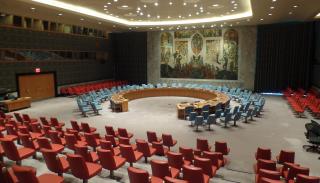
Breadcrumbs navigation
Dissenting at the United Nations: Interaction orders and Venezuelan contestation practices (2015–16)
The Venezuelan participation in the United Nations Security Council (UNSC) in 2015 and 2016 was expected to be a challenge for the institution, as the Maduro government adopted controversial positions at the General Assembly (UNGA). However, the Venezuela contestation line did not appear clearly at the UNSC. In their new article for BISA journal for Review of International Studies (RIS), Mélanie Albaret and Élodie Brun draw upon an in-depth qualitative study, Erving Goffman's work, and literature on contestation in international organisations (IOs), to interpret this apparent inconsistency from the concept of interaction order.
Read this short summary to find the key points, before reading the article in full.
'Dissenting at the United Nations: Interaction orders and Venezuelan contestation practices (2015–16)' draws attention to the contestation of and within international organisations from an in-depth qualitative study of Venezuela participation at the UNGA and the UNSC in 2015-2016. It offers a significant case to study and compare the simultaneous practices of contestation in different forums of an actor claiming to lead a contestation diplomacy.
Contestation characterizes Venezuelan international diplomatic action under the Bolivarian Revolution (Hugo Chávez, 1999–2013; Nicolás Maduro, 2013–to date). Venezuela developed an anti-capitalist, anti-imperialist, anti-US discourse and was critical of some international organizations, particularly the United Nations Security Council (UNSC). When it was elected to participate in the institution between 2015 and 2016, some actors expected dissenting and challenging Venezuelan positions. However, while the Maduro government did adopt controversial positions at the General Assembly (UNGA), Venezuela’s contestation line did not appear clearly at the UNSC. Over the two years of its mandate, Venezuela went alone and therefore broke consensus on only four of the 141 resolutions adopted (out of 146 votes). However, a more detailed analysis of the votes shows that Venezuela was the member with the most abstentions in 2015 and the member with the greatest number of negative votes in 2016.
Drawing upon Erving Goffman’s work and literature on contestation in international organisations (IOs), we interpret this apparent inconsistency from the concept of interaction order. Beyond references on the logic of the cost/benefit ratio, the influence of international context, decision-making and bureaucratic processes, or institutional design, Goffman’s framework allows us to focus on informal practices and interactions. Goffman defines an interaction order as ‘a system of practices, conventions, and procedural rules comes into play which functions as a means of guiding and organizing the flow of messages’. By paying attention to the interactions, it is thus possible to study a social order that does not strictly correspond to that of the institutions, including contestation practices that cannot be reduced to institutional contestation as they also take place within interaction.
From this perspective, we argue the UNGA and the UNSC each constitutes a specific interaction order that influences the way contestation practices are channelled. The decorum suggests the difference between each interaction order. The UNGA is organised as a forum: during the general debate, the speaker expresses his/herself to a public audience. On the contrary, UNSC meetings take place around the horseshoe table that implies an intimate entre-soi. In these two differently decorated stages, diplomats do not interact with the same actors. At the UNGA, most resolutions are supported by one or more groups, indicating collective affiliation. At the UNSC, the 15 members are required to collaborate, even when bilateral relations are strained, such as in the case of Venezuela and the United States (US). Whereas the UNGA serves as a tribunician platform, the UNSC functions as a team.
Consequently, Venezuela’s contestation line at the UNGA does not find its way to the UNSC or misses its objectives, because each interaction order implies different ways of expressing contestation. For instance, while Venezuelan representatives resorted to bombastic rhetoric at the UNGA, they avoided denouncing partners in the UNSC. Venezuelan solidarity with isolated regimes (by Western powers), such as Syria, Iran or North Korea, that was staged at the UNGA, did not impede the search for consensus at the UNSC, even on Syria. Finally, at the UNGA, Venezuela usually differed from the US, formalising a contestation practice. In the UNSC, it only voted against draft resolutions on four occasions, together with other members.
More interestingly, the Latin American state abstained alone four times. However, during official sessions of the UNSC, each contestation attempts were blatantly undermined by other members’ interactions, as revealed by speeches and exchanges. These episodes highlight the difficulties specific to Venezuelan diplomacy, the ideological incoherence and the lack of internal capacity that were more acute during the period under review.
But the analysis of contestation practices does not stop at these formal sessions. Venezuelan representatives also use informal and backstage actions to express their dissent, not without difficulty. The Venezuelan controversial use of the any other business’ meetings (AOBs) with no public records during its UNSC presidency exemplifies these behind-the-scene contestation attempts.
An analysis based on the notion of interaction order provides a better understanding of Venezuela’s moderation at the UNSC. It is not the result of a lack of contestation but of an invisibilisation of contestation by interactive practices. Contestation initiatives often became invisible through different processes. Venezuelan contestation was downgraded either by the interactions between permanent members as was the case after the vote on Resolution 2209 or because it was part of a configuration linked to divisions between permanent states, namely the US versus Russia and China. In other cases, Venezuela contestation was often relegated backstage or behind the scene and/or was framed in acceptable forms when it occurs in official meeting.
Venezuelan contestation occurred at the UNGA and the UNSC, but in both cases, it led to the reproduction of the interaction order or for changes to take place only at the margin. Thus, our study opens the analysis of IOs change processes beyond institutional reforms. It also provides a better understanding of the complexity of dissenting practices at the UN, at a time when a growing number of actors contest multilateral formal and informal rules.
Want to know more? You can read the full article at DOI: https://doi.org/10.1017/S0260210522000043.
BISA members receive access to all content from RIS (and to our other journal European Journal of International Security) as a benefit of membership. To gain access, log in to your BISA account and scroll down to the 'Membership benefits' section. If you're not yet a member join today.


